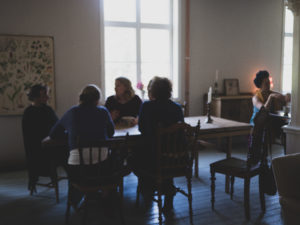
My second business launch didn’t go according to plans. And I had a lot planned. Good stuff: sessions, workshops, webshop, it was all coming together that February a few years ago. Premises booked, schedules set, posters illustrated, clients on a waiting list. After more than six months of preparation, writing and hustling, it was time to run a business – that is, to make money from what I had built.
But in February I was in bed, so nauseous I could barely think. Pregnant.
Some women get shiny hair, look radiant and “have never felt so good”. Me, I’m dissy with nausea, twentyfour hours a day for months and months, completely knocked out. I get spots like a teenager, and the patience and sleeping habits of a two year old. And I can’t handle my job.
With despair, I watched it all fall to the ground. There goes my neatly planned existence, smashed to a million pieces. It doesn’t happen very often. Usually, we keep those balls in the air, no matter what.
That’s why it gets interesting when we finally drop them. Questions arise in the silence that follows.
Who am I when I don’t succeed? When I am of no use, to myself or anyone?
We invest so much of ourselves in what we accomplish. In what we earn. In our profession. And having a job is a good thing, I whish everyone the freedom of being able to support oneself. But what if there are no jobs? Or if I can’t manage them? What if my business fail? How vulnerable it is to place a part of ourselves in something so easily lost.
We often miss the opportunity to really listen to the questions that arise when we drop the balls. The ones that could have forced us to go a little deeper, to see if we can anchor our worth in something other than measurable accomplishments. We miss the oppurtunity because we run from that place like our lives depended on it.
And no wonder. To tackle those questions is a perilous project in our society.
How do we describe the soul stretching that comes with failing? How do we describe the slumbering potential in having to quit? When we are forced to yield to outer limitations and thereby discover the boundlessness of our inner landscape. Do we even have a language for that process?
I thought about this, that spring when my plans and my strength crumbled. A few lines out of George Eliot’s great novel Middlemarch came to mind, about the protagonist, Dorothea. Strong, intelligent, beautiful Dorothea, who started out with such grand ambitions and had to watch them all come to nothing.
“Her full nature (…) spent itself in channels which had no great name on the earth. But the effect of her being on those around her was incalculably diffusive: for the growing good of the world is partly dependent on unhistoric acts; and that things are not so ill with you and me as they might have been, is half owing to the number who lived faithfully a hidden life, and rest in unvisited tombs.”
A hidden life. Most of us do not become heroines, and most good deeds go unnoticed.
Can we handle that?
Can we rise above our hunger for acknowledgement and praise?
Can we learn to recognise and appreciate the reach of the human soul, even when our bodily strength fails?
In Middlemarch, Eliot argues that whoever places identity and worth in what she can accomplish in the outside world builds a rickety castle. Accepting that means – finally – growing up.
I eventually felt stronger (and slightly more grown up), and able to move forward with my business again. As you know, since you are reading this. Nothing I have created since would have come into being, had I not been forced to give up those early and – as it turned out – premature plans.
As I move forward with a new, expanded vision for my business and a deeper understanding of purpose and goal, I keep reminding myself that I owe it all to failing.









